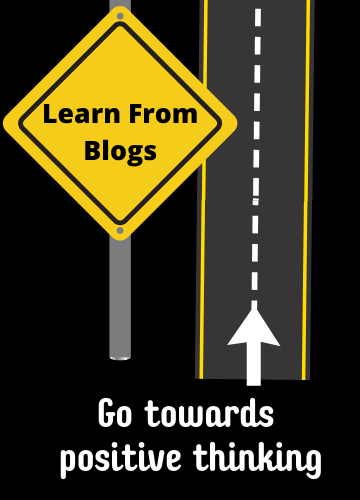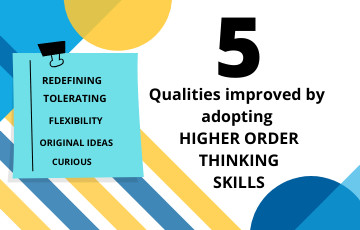
1. Redefining:
People with higher-order, thinking skills can redefine the entire problem in a completely fresh angle. We wouldn’t have seen it before.
2. Flexibility:
Flexibility is:
- Adapting to new situations
- Improvisations
- Shifting strategies
- Welcoming fresh perspectives to meet any challenges.
When you adopt higher-order thinking, you improve your flexibility levels. The more flexible you become, the more thoughts and viewpoints you perceive. In turn, it improves your critical thinking and problem-solving abilities.
3. Ability to create original Ideas:
When you adopt higher-order thinking, it improves your originality. It kindles your creativity.
Want to know how?
Higher-order thinking abilities will stimulate the brain to look for wider possibilities to resolve the problems.
You observe, question, listen, analyze, process, and validate everything around you. This critical thinking stimulates you to find what is needed. And, see what new changes can be made.
You will think about new frameworks/strategies to use. You become curious. It all leads to drawing original ideas.
4. Always Looking Forward:
Critical minds are curious minds.
That too, people who adopt higher-order thinking in their approaches are
- Always curious, analytical, and logical.
- They look forward to anything and everything in their life.
- They are never afraid of changes and challenges.
- They keep looking forward to facing new things and meet new people.
- They gain more knowledge.
- They widen their mental abilities.
If you want to be a better critical thinker and bring high order thinking skills, keep looking forward and challenge yourself.
5. Tolerating Ambiguities:
The key quality of higher-order thinking skills is, people will tolerate uncertainties, and ambiguities irrespective of any situation in life. It makes them highly resilient than the rest.
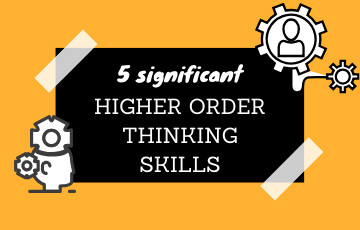
Higher-order thinking abilities will carry your critical-thinking levels to a peak. Here are lists of 5 higher-order thinking skills you should follow in your life. It not only improves your critical thinking abilities but also makes you highly productive.
1. Being Original:
By being yourself, you realize your strengths, weaknesses, abilities, and improvement areas. Once you know yourself, you align your thinking accordingly. By being an authentic person, you enhance your originality and creativity in things you do.
2. Using Imagination:
Critical thinking starts with imagination. If you can imagine different outcomes, perspectives, and possibilities for a problem, it means your higher-order thinking abilities are growing.
3. Finding Purposes:
Higher-order critical thinking has made many people find their true purpose and passion. When you start thinking critically in life, you will identify
- What do you want?
- What works?
- What doesn’t fit?
- What is irrelevant?
- What are the future possibilities?
- Will this education/career work for me? Etc.
These questions form the basis of finding your purpose in life. Among the list of higher-order thinking skills, ‘Finding Purpose’ is the most interesting and stands out.
4. Ability to Accept Changes:
Brian is a mix of ‘constant changes’ and ‘existing systems’. Accept new changes. Your brain will combine and connect new changes with existing data. Your critical thinking improves. The result is, you become efficient in finding better perspectives.
5. Open-Minded Thinking:
Your higher-order thinking levels improve when you become open-minded and accept things. Higher-order doesn’t work when your mind is narrow and doesn't see the world positively.
Takeaway:
The above list of higher-order thinking skills determines an individual’s critical thinking levels and helps them improve better.
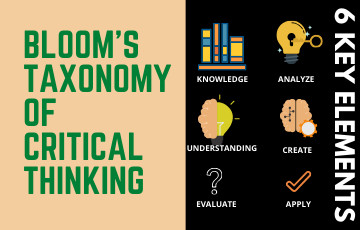
Benjamin Bloom formulated a pyramid made of six key elements of critical thinking. The framework suggests that to excel in critical thinking, one has to go through the levels mentioned in the pyramid.
The six key elements of bloom’s critical thinking framework (revised) are:
- Knowledge/Remembering
- Understanding
- Applying
- Analyzing
- Evaluating
- Creating
Level 1: Knowledge/Remembering
An individual’s ability to:
· Grasp basic concepts
· Recall facts
· Define problems
· Remember from memory
· Ability to repeat or recollect information
Level 2: Understanding
An individual’s ability to identify, describe and define a problem. Also, this level is where an individual classifies and explains problem-associated factors. And recognize the key reasons behind problems.
Level 3: Applying
The ability to execute tasks or implement solutions the right way!
This level is where critical thinkers resolve, interpret, and schedule tasks and solutions.
Level 4: Analyze
This level is where an individual:
- Draws correlations
- Ask questions
- Does examinations
- Experiments multiple ideas
- makes comparisons
- Review previous groundworks
The actual Problem scenario gets shaped at this level.
Level 5: Evaluate
You have analyzed all the variables and have come to the last stand. On this fifth level, defend and justify your eventual decision/stand.
You should argue, defend, add value, add support, and explain why this last solution is right for the problem.
Level 6: Create
You resolve the problem by applying the final-solution. This level is where you implement your original ideas and works into assembly after justifying it.
How Bloom’s Taxonomy is related to Critical Thinking?
Bloom further divided the six key elements of critical thinking into two major categories called:
- Lower Order Thinking Skills: Knowledge, Remembering, Understanding, Applying
- Higher-Order Thinking Skills: Analyze, Evaluate, Create
Bloom suggests that to become a good critical thinker, one has to develop both Higher-Order and Lower Order thinking skills.
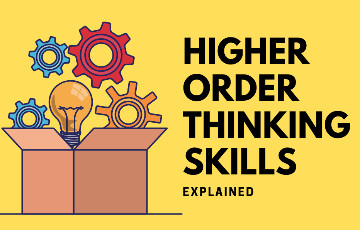
Higher-Order Thinking skills are above the basic level of thinking skills. They are beyond basic abilities like listening, memorizing, reading, comprehensions, etc.
In simple terms, higher-order thinking is, finding out deeper meaning than basic interpretations. You will explore unique perspectives. You do detailed understandings and deep data analysis.
Higher Order Thinking Skills:
Higher-order thinking skill is about creating original work. We take in several approaches like logical, reflective, cognitive, and creative thinking to determine problems and solutions.
Your critical thinking ability starts with lower-order thinking skills (ability to grasp basics) and gets enhanced with higher-order thinking skills.
We can summarize higher Order thinking in ten steps as:
- You observe what is happening?
- From your observations, you understand what the problem is.
- You figure out further details through questions like why the problem occurred, when it happened, How to categorize this problem, Etc.
- You interpret the data.
- You break down those data into different categories and ask the “what if” questions.
- You will compare the background data.
- You will distinguish or subdivide the problems based on patterns and connections. You make your predictions and inferences from all angles.
- You evaluate your inferences. You will distinguish what is relevant and what is the ambiguity.
- You validate the answers for questions like How to justify this solution, what is other people’s opinion in this, why the solution should be taken, how to prove things right, how to assess the solution, how to defend, etc.
- You implement the solution. You will look for unique ways to implement, adopt, and execute the solutions.
Your Higher Order Thinking Skills starts from steps “E to J”.
To Conclude:
Everyone can do a basic level of thinking. What makes critical thinkers stand out is, they implement high order thinking abilities in all their approaches.
"The road to success and the road to failure are almost exactly the same." -- Colin R. Davis



